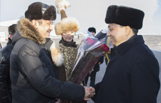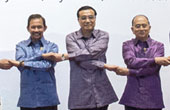Commerce decision said to hurt US solar makers
By Amy He in New York (China Daily USA) Updated: 2014-12-24 12:08US solar manufacturers are already feeling the impact of the latest US Commerce Department decision to levy tariffs on Chinese solar exports, according to the Coalition for Affordable Solar Energy.
Commerce's decision to impose tariffs on solar modules from China will "undercut the growth of American solar jobs and hurt our domestic solar industry," said Jigar Shah, president of the Coalition for Affordable Solar Energy (CASE), an organization that opposes the original petition filed by SolarWorld that led to the Commerce decision, on Tuesday.
Since the decision, manufacturers like Georgia-based Suniva and Michigan-based Hemlock Semiconductor have been hurt, the company said in a Dec 17 statement. Hemlock Semiconductor said last week that it would close its $1.2 billion Clarksville, Tennessee, plant due to "ongoing challenges presented by global trade disputes".
The facility was never operational, but the closing would affect about 50 employees.
"As difficult as this is, the continued market adversity and complex political conditions have left no economically viable options for Hemlock Semiconductor to operate the site," said Denise Beachy, president of Hemlock Semiconductor, in the release. "It is unfortunate for both the company and the community that these conditions have forced us to take this action."
In December 2013, the US arm of German solar manufacturer SolarWorld filed a petition stating that Chinese manufacturers sidestepped 2012 import duties by taking production of solar products to Taiwan, and floodingUS markets with cheap goods. SolarWorld also accused Chinese manufacturers of subsidies from the Chinese government.
On Dec 16, Commerce released its final decision on its investigation into the antidumping and countervailing claims in the affirmative, saying that the solar products were dumped and that manufacturers were getting subsidies.
Commerce said products from China were dumped at margins from 26.71 percent to 165.04 percent, and rom Taiwan at margins from 11.45 percent to 27.55 percent.
A final determination from the International Trade Commission will come at the end of January and if the ITC issues an affirmative determination, saying that there has been injury caused to the domestic market, then US Customs will require cash deposits for countervailing duties equal to final subsidy rates determined already by the Commerce department.
"Given the global threat of climate change and the recent US-China commitment to reduce carbon emissions, it makes absolutely no sense to impose unproductive tariffs on solar imports that also damage US solar companies," said CASE's Shah.
CASE said that companies like Suniva are being put in the "bizarre position of paying severe import duties on a product (photovoltaic cells) they manufactured in America" when the cells are assembled in China.
"We continue to urge the governments of the US and China to accelerate negotiations to preserve free and fair trade in the global solar industry. Affordable solar panels are a good thing for the US, China, and the world," Shah said.
Paula Mints, chief market research analyst at SPV Market Research, told China Daily that "all energy technologies are subsidized" so there's not a normal-functioning market in any country.
There is no such thing as a "fair and even playing field," Mints said. "The people that will potentially be hurt are the buyers of modules. The installers and system integrators, the developers, they rely on the lowest cost of hardware."
amyhe@chinadailyusa.com
- A look inside Bill Gates' 35 million home
- Cats exhibition held in Minsk
- Obama welcomes Xi with nihao at elaborate White House ceremony
- EU and China agree to cooperate on anti-terrorism agenda
- Offices of world leaders
- Mobike touts bike-sharing scheme in LatAm
- 1 killed, 20,000 evacuated by wildfires in Northern California
- Popular Chinese dishes in the US










